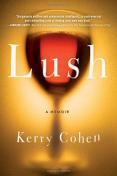BKMT READING GUIDES
Lush: A Memoir
by Kerry Cohen
Paperback : 240 pages
0 club reading this now
0 members have read this book
Introduction
When Loose Girl author Kerry Cohen reached her early 40s, she realized she had a drinking problem. Yes, she could get up on time, bring her kids to school, make dinner, chat with friends, and all around have a normal day, but, throughout it all, Kerry was waiting for her five o'clock glass of wine. Maybe two glasses. Maybe a bottle. Just enough to blur the edges of her life that had become a monotony of vacuuming, carpooling, and disagreements with her husband. Kerry had replaced one addiction with another, instead of seeking sex she was seeking merlot. Instead of intimacy, she craved the fuzziness of a nice buzz.
What she also realized was: she wasn't the only one.
LUSH is a gripping memoir that examines Kerry's struggle with alcohol, a struggle that a rising number of middle-aged women are facing today as alcohol dependency amongst females drastically increases. A wonderfully poignant and relatable follow up to her memoir Loose Girl, LUSH follows Kerry as she attempts to rediscover the awe in her life, leaving past mistakes, regrets, and the bottle behind.
Excerpt
I sometimes drank in the mornings. “Sometimes” is vague. It might have been often. I mean, relatively often. Compared to most people. I would say I drank too many times in the mornings, because pretty much anytime you’re drinking in the morning, it’s too many times. I called this breakfast wine. Breakfast wine is found in glasses from the night before. If it’s not in your glass from the night before, you might find it in someone else’s glass. Very rarely, you will find it in a not-quite-empty bottle. If you’re a real alcoholic, you won’t find it in your own glass, because alcoholics don’t leave alcohol in their glasses. I once heard that a critic condemned the award-winning movie Ironweed because in one scene, Meryl Streep leaves alcohol in her glass at the bar, and this, according to the critic, is something no alcoholic would ever do. Incidentally, because I had plenty of times left wine in my glass before bed, I hoped this was one more piece of evidence that I wasn’t a true-blue alcoholic. ...Discussion Questions
On page 23, Kerry writes, “Addiction specialists say that everyone has either a problematic relationship to alcohol, a controlled relationship to alcohol, or no relationship to alcohol.” What is your relationship to alcohol? Has it changed over time? Why do you think that is?Kerry makes clear that prior to this time in her life, she hadn’t been a drinker, and she believed this might be evidence that, while she had a drinking problem now, she could someday have a normal relationship to alcohol again. Do you agree? Why or why not?
Throughout the book, Kerry notes that it’s women, especially middle-aged women, who seem to be drinking more around her. Why do you think this might be?
Kerry notes that the story she tells about Bob is simply the ‘she said’ part of what happened. Can there be more than one story? Is one story more ‘true’ than another?
Kerry writes about addiction as resembling a balloon that bulges out with other types of addictions when one is pushed down. Do you have a “balloon” of addictions? What’s inside your balloon?
Kerry came to believe that her drinking was a symptom of her real addiction – sex and love. What do you think about this?
The Rat Park study by Bruce Alexander is described on page 82. How does this study apply to your life or to people you know?
On page 102 Kerry references Lidia Yuknavitch’s quote, “I’m not the story you made of me,” referring to the way we make sense of our lives. What stories do you have about yourself? Are they yours, or were they made up about you by others, or by society?
Kerry writes of addiction, “It is a deeply layered spiritual problem. It is a human problem” (page 106). Discuss this idea.
Life did not suddenly get better after Kerry stopped drinking heavily. If you are in recovery from an addiction, what was your experience? What did you think was going to happen versus what actually happened?
Book Club Recommendations
Recommended to book clubs by 0 of 0 members.
Book Club HQ to over 90,000+ book clubs and ready to welcome yours.
Get free weekly updates on top club picks, book giveaways, author events and more








